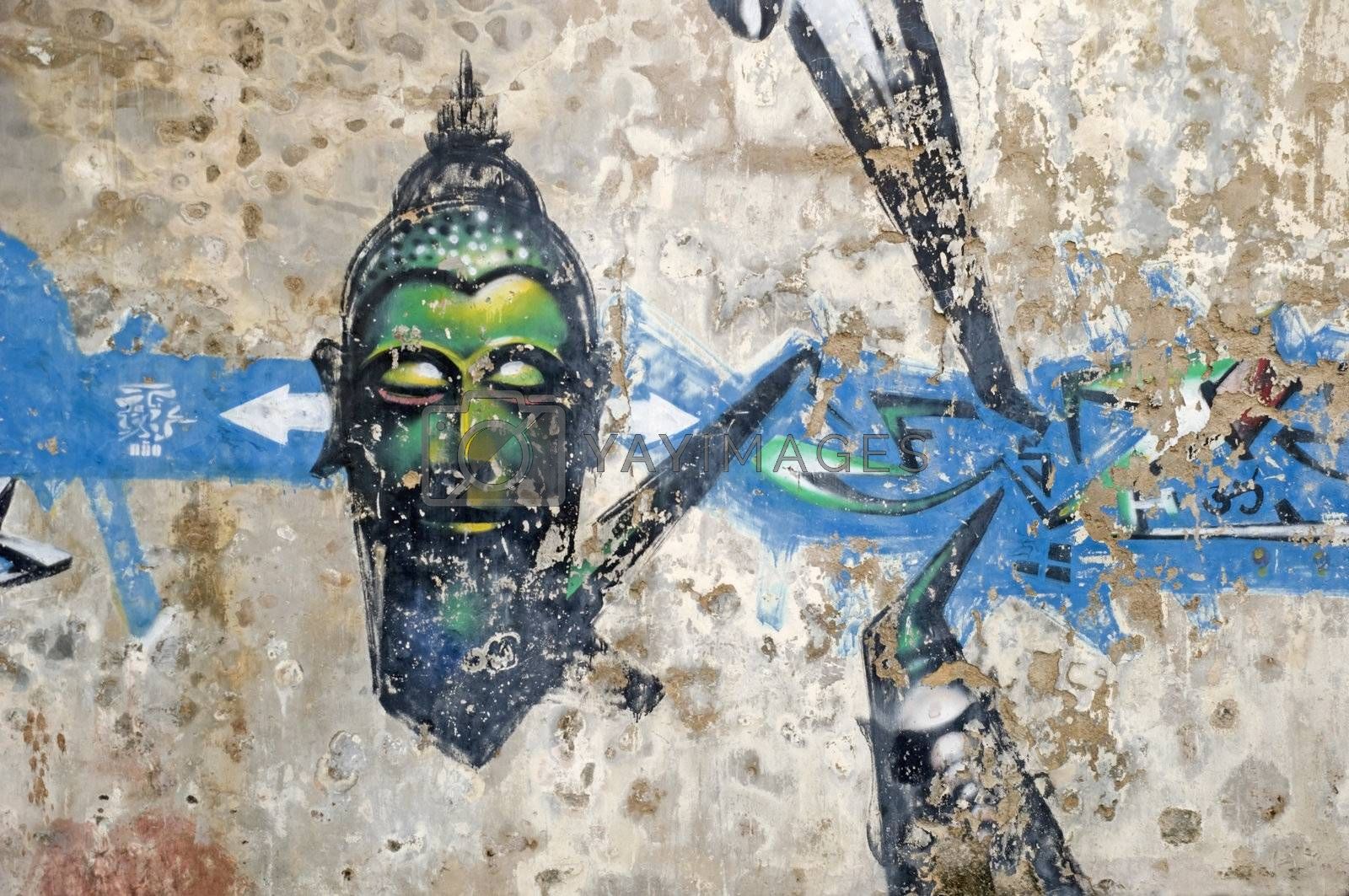Normally, when we’re asked where we are in relation to our body, we would probably reply that we’re ‘in our head’. That’s what it feels like – it feels like we’re there somewhere behind our eyes, looking out at the world from this secluded position. We don’t ever come out from here – or at least only rarely. This is what it almost always feels like and if it ever felt different to this (i.e. that we weren’t stuck behind our eyes) we would probably find it rather strange!
But having said this, we can also see that the degree to which we seem to be ‘stuck’ in our heads varies all the time, in a subtle kind of way. If I’m relaxed and happy then the quality of being trapped there is absent and it’s as if I’m in my head but also at the same time not in my head. My sense of locality is somehow ‘diffused’ or ‘blurred’. The sharp edges have been rubbed out. It’s as if I’m freer with regard to where I experience myself as being – we could say that it feels as if I am extending a bit further out into the space that surrounds me than might usually be the case. I have more ‘extension’ into the world, I am less contained. I’m ‘out there’. There is no feeling of being ‘held back’ or ‘limited’ in any way, no feeling of being painfully separate (or disconnected) from everything else.
If I am feeling really happy and relaxed and ‘at one with the world’ (and nothing is worrying or bothering me) then I won’t feel myself to be limited or disconnected at all. I won’t find myself in the usual situation of being ‘stuck in my head looking out’, and this is of course when we feel most ourselves. At such times it’s as if my sense of self is ‘bigger’, more expansive than usual. I’m not shutting the world out and the world isn’t shutting me out!
On the other hand, if I’m not feeling good in myself – if I am feeling anxious or afraid or upset or angry or frustrated, and so on – then the experience is that I am subjectively isolated in terms of being ‘separate’ or ‘disconnected’ from the world and other people. I’m not expansive. In this case I am contained ‘in my own little world’ and this world feels as if it’s entirely in my head. If I am worried then the feeling of being stuck in my head is particularly intense – it is as if the whole world has shrunk to just me and my thoughts, and these thoughts aren’t in the least bit ‘expansive’ or ‘extensive’ (which is to say, they don’t ever take me anywhere different to the place where I already am). On the contrary, my thoughts just go around and around in tight circles! There’s no space, no freedom in this claustrophobic little world of ‘me + my thoughts’…
As a general rule therefore, when we are stuck in some unhappy state of mind this goes hand in hand with being caught up in our heads. Our world ‘narrows down’ and becomes painfully restricted. It’s like being in a prison cell. It’s like being in solitary confinement. Sometimes people describe feeling as if there is some kind of barrier around them, like thick glass perhaps. We can see the world but we can’t reach out and touch it – we can’t be part of it. We’re in the world but at the same time we’re not in it, we’re onlookers rather than full participants…
One way to explain all of this is to say that the containment facility which we’re imprisoned in (or the barrier which we’re trapped behind) is the rational (or ‘thinking’) mind, which has stopped being a useful tool or instrument to us, and has become instead a source of suffering. It is inevitable that the rational mind will disconnect us from the world in the way that we have just described if it ‘takes over’ and starts running the show all by itself. The way the rational mind works is by controlling everything and whilst controlling is extremely useful (if not essential) in many cases, when we start controlling everything then we automatically put ourselves the situation where we are disconnected (or alienated) from everything.
This is easy to see if we think about being a boss or a manager – if you are the manager then your job is not to be friends with everyone but to keep an eye on them and make sure the staff who you’re in charge of do what they’re being paid to be doing! This way you’re doing your job properly, but the inevitably consequence of your role as boss is that you are going to be in an isolated position. You’re going to be ‘on your own’. In exactly the same way therefore when we’re caught up in controlling everything (i.e. when we’re in ‘control mode’) we are going to feel isolated, alone, disconnected, etc. When I’m in control (or trying as hard as I can to be in control) then I can’t leave any gaps for stuff to happen by itself, I can’t trust the world to ‘carry on by itself’ but rather I have to be on top of everything. I have to micro-manage every last detail. But because this necessarily means ‘holding myself back from life’ I am not going to feel part of what is going on – I am ‘on the outside, looking in’, so to speak, and the feeling that comes from ‘being on the outside’ like this is a fundamentally disconnected one.
The thinking mind is all about controlling (or ‘monitoring and evaluating’, which is the same thing) and when we find ourselves controlling on a full-time basis, monitoring and evaluating on a full-time basis, being stuck in our head on a full-time basis, this equals mental suffering. There is absolutely no way that we can be controlling the whole time and not feel BAD! Alan Watts explains this in one of his lectures by saying that life is like a dance in which neither party leads – some times I lead and sometimes life leads and that is where the harmony comes in. If I am totally passive the whole time that doesn’t work out well because I have evaded all responsibility, and if I try to lead (or control) the whole time this is no good either because I’m disconnected from life. If I lead the whole time I’m taking on too much responsibility – I have turned life into my puppet, which turns everything into a farce, into a travesty of what it should be…
The same principle is of course true for any relationship – if I dominate the relationship and thus turn my partner into my puppet then this just isn’t going to work. The relationship is doomed. It isn’t going to work because there is no relationship – there’s just me in it, and the other person is just a passive reflection of my wishes. But on the other hand if I passively agree with my partner in everything then this is never going to work either for exactly the same reason. There’s only one person in it. Without relationship (which means both ‘self’ plus ‘other’, both ‘leading’ and ‘allowing oneself to be lead’) we are stuck in ourselves, and in exactly the same way when I am trying to be in control of life all the time I am ‘stuck in myself’, I am ‘stuck in my own head’…
The practice of mindfulness is therefore all about learning to find a healthy relationship with life, with the world around us, so it isn’t just me stuck in my own head trying to stay in control of everything the whole time! This is an exhausting business at the best of times and apart from being inherently draining it means that I never ever get to experience a bigger picture than just me trying to get things to work out the way I think they ought to. It means that I never get to experience the ‘harmony’ of life, which is when this ‘bigger picture’ gets to emerge. Instead, everything is always disharmony. It is disharmony because it is always a struggle and I am always the one who has to keep on struggling!
Struggling never leads to harmony – you can’t ‘struggle for harmony’ any more than you can ‘fight for peace’! If I am temporarily successful in my struggling then there will be a temporary respite to the effort, but this isn’t harmony because it’s just ‘me temporarily getting my own way’. Similarly, if I am successful in fighting then there will be a type of peace, but it will not be a genuine peace – it will just be the type of peace that comes when I have succeeded by force in temporarily silencing (or otherwise removing) my opponents. For there to be harmony or peace there has to be a genuine relationship, and a genuine relationship can never be arrived at by coercion (i.e. by ‘control’).
All of this comes down to the question of ‘where we experience ourselves being in relation to our body’, therefore – as strange as this may sound! If I experience myself as being tightly contained in my own head, then I am in ‘control mode’ and I’m going to experience myself to some extent or other as being ‘disconnected’ from everything around me. I am also going to experience myself as being in some kind of a struggle with the world – what’s more, I am going to experience myself as being in a struggle that I’m ultimately going to lose, which is the where the anxiety comes in. It is quite understandable if I feel that I am in some way ‘fighting a losing battle’, because I have taken on far too much responsibility. I have taken on responsibility for everything, and ‘everything’ has got to be too much!
If on the other hand I experience myself as being less ‘definitely located’ in my head, less ‘precisely located’ in some kind of small space behind my eyes, then this shows that I am relaxed in my relationship with the world (and myself). I am not engaged in a struggle or a battle of wills (or in any other type of intrigue) and as a result I do not feel separate from the world, I do not feel that I am ‘cut off’ from the world, ‘different’ from the world, ‘at odds’ with the world, and so on…
This is very interesting because it shows that feeling well in ourselves (or feeling ‘at ease’) isn’t a function of having a tightly-defined sense of self, or having clearly-defined boundaries, or anything like that. This is the exact opposite of how we usually think, and also the exact opposite of what we’re usually told. The ‘usual assumption’ is that it is mentally healthy to be definite about our identity, to be ‘this but not that’, to be definite about who we think we are and who we think we aren’t (which means being located in some kind of ‘conceptual box’). But being ‘mentally healthy’ really means being Whole and being Whole has nothing to do with being clearly defined, nothing to do with ‘being in a box’. Being ‘Whole’ means having no limits, it means that we don’t exclude anything – as soon as I have a limit to who I am (or who I think I am) then I’m not Whole!
We know we’re mentally healthy or ‘well in ourselves’ when we feel able to relax our boundaries and ‘take a risk’ with regard to relating to the bigger picture, when we’re able to take the risk of ‘not defining ourselves’. We know we’re being ourselves (or ‘at one with ourselves’) when we’re not feeling defensive and wary and as a consequence ‘all caught up in ourselves’. There’s no way to genuinely and openly relate to the world around us and at the same time be defensive or controlled – the latter necessarily excludes the former. The only way to get back to being ourselves is to gently start relaxing our rigid concept of ourselves, and letting our awareness return to being the ‘uncontained’ (or undefined) way that it originally was before we started trying to consolidate our idea of who we are. In essence – not to make this sound too complicated (which it really isn’t) – this involves coming out of our heads and into reality…
The question “Where are you?” is therefore a very good starting-off point with regard to looking at how relaxed (or happy) we are. It tends to sound like a stupid question because we always assume that we’re in the same place – i.e. right behind our eyes somewhere in the middle of our head – but once we start paying attention to where exactly we feel ourselves to be we can see that there exists a whole range of possibilities between being tightly focussed (or caught up in our thinking) to being much more ‘expansive’, much less ‘contained’. Where we are in this range of possibilities depends on how much trust we feel in terms of our relationship with the world around us. Or we could also say that how trapped or contained we are in ourselves depends how relaxed we are, how at ease we are…
I might feel that I am ‘in my head’, or on the other hand I might feel that I am more ‘in my body’. To be in my body is more relaxed, and more expansive, than being in my head – it feels better. I might feel that I am extending or expanding ‘beyond my skin’ out into the space around my body. I might feel that I have no hard-and-fast ‘edge’ (i.e. boundary) to my experience of myself, and this is more relaxed, more expansive again. This is an even more peaceful and spacious and ‘connected’ feeling that being in my body (which is more peaceful and spacious and connected than being in my head). Because I have no ‘hard-and-fast edge’ I am connected to the world around me.
How far out I feel myself to expand beyond my usual parameters is a function of how ‘at ease’ I am, therefore. How far out I feel myself to extend (i.e. how expansive my sense of self is) is an indication of the degree of openness (or trust) that exists with regard to my relationship between myself (or ‘who I conceive myself to be’) and the world around me. I’m ‘open’ rather than being all ‘closed-up’ like an extremely cautious clam!
If we’re open enough, trusting enough, relaxed enough we discover that there’s actually no practical separation between ourselves and the world at all. We discover that ourselves and the world are actually ‘all of one piece’ – which is of course very obvious from an intuitive perspective, even though it is very far from being obvious from the rational point of view!
No matter who (or what) we think we are within the established terms of our everyday experience, we are always more than that. No matter how we define ourselves, we’re always ‘more than that’. This being the case, why bother to define ourselves at all?
Image – wallpaperup.com





